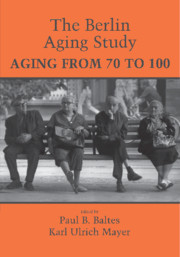Book contents
- Frontmatter
- Contents
- Acknowledgments
- Introduction
- Part A Theoretical Orientations and Methods
- Part B Major Results from the Four Research Units
- Part C Interdisciplinary Findings
- 9 Men and Women in the Berlin Aging Study
- 10 Social Relationships in Old Age
- 11 Self, Personality, and Life Regulation: Facets of Psychological Resilience in Old Age
- 12 Limits and Potentials of Intellectual Functioning in Old Age
- 13 Sensory Systems in Old Age
- 14 Everyday Competence in Old and Very Old Age: Theoretical Considerations and Empirical Findings
- 15 On the Significance of Morbidity and Disability in Old Age
- 16 The Utilization of Medical and Nursing Care in Old Age
- 17 Sources of Well-Being in Very Old Age
- Part D Overview and Outlook
- Notes on Contributors
- Abbreviations
- Author Index
- Subject Index
10 - Social Relationships in Old Age
Published online by Cambridge University Press: 06 December 2010
- Frontmatter
- Contents
- Acknowledgments
- Introduction
- Part A Theoretical Orientations and Methods
- Part B Major Results from the Four Research Units
- Part C Interdisciplinary Findings
- 9 Men and Women in the Berlin Aging Study
- 10 Social Relationships in Old Age
- 11 Self, Personality, and Life Regulation: Facets of Psychological Resilience in Old Age
- 12 Limits and Potentials of Intellectual Functioning in Old Age
- 13 Sensory Systems in Old Age
- 14 Everyday Competence in Old and Very Old Age: Theoretical Considerations and Empirical Findings
- 15 On the Significance of Morbidity and Disability in Old Age
- 16 The Utilization of Medical and Nursing Care in Old Age
- 17 Sources of Well-Being in Very Old Age
- Part D Overview and Outlook
- Notes on Contributors
- Abbreviations
- Author Index
- Subject Index
Summary
The aim of this chapter is to describe the number, nature, and functions of social relationships in old age. The consequences of widowhood, childlessness, and institutionalization on the social relationships and loneliness of elderly people are also examined. The findings are based on the accounts of the Berlin Aging Study (BASE) participants and reveal that it is incorrect to assume that the social integration of older adults is marked by a lack of role in society, or that social relationships remain unchanged in quality and quantity into very old age.
There is a high degree of childlessness among those aged 85 years and older, but this can primarily be interpreted as a cohort effect. Although the loss of relatives from one's own generation is a common occurrence in very old age, the experience of being a great-grandparent also gains in importance. No uniform age differences can be found where nonrelatives are concerned either; whereas the number of friends decreases with age, the proportion of old people who include other nonrelatives in their social network remains relatively constant. The social network of widows and widowers has a structure similar to that of married people. However, the childless have smaller networks than parents, and the institutionalized have smaller networks than those living in private households. Married people feel lonely less frequently, whereas the institutionalized and the childless do so more often. […]
- Type
- Chapter
- Information
- The Berlin Aging StudyAging from 70 to 100, pp. 282 - 301Publisher: Cambridge University PressPrint publication year: 1998
- 6
- Cited by



